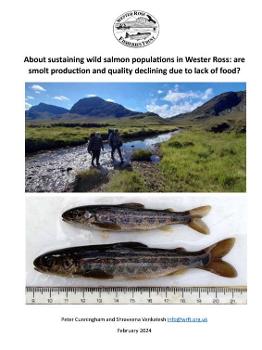About sustaining wild salmon populations in Wester Ross: are smolt production and smolt quality declining because of a lack of food?
Posted: Monday 5 February, 2024 @ 13:27:31

Wester Ross area juvenile salmon survey 2023 report
This document summarises the main findings of juvenile salmon surveys in Wester Ross (Northwest Scotland) in 2023 and discusses potential actions available for important wild salmon populations.
It focusses on differences in the sizes of salmon fry and salmon parr and juvenile salmon biomass per unit area between rivers and survey sites; and considers what this means in terms of juvenile salmon growth, salmon smolt production and smolt ‘quality’, at a time when rates of marine survival of smolts are low.
Results varied. For sites surveyed in the River Canaird (below Langwell falls and in River Runie), Ullapool River and Dundonnell River, density estimates for both salmon fry and salmon parr were mostly high. At sites surveyed in the Runie and Dundonnell rivers, parr densities and sizes suggested production of >20 smolts per 100m2 of wetted habitat per year for some areas. These rivers already have areas of good or improving habitat for production of juvenile salmon, partly as a result of recent riparian habitat revival projects.
In contrast, at some sites in the Gruinard River and Little Gruinard River [Special Area of Conservation for Wild Atlantic Salmon], juvenile salmon were particularly small for their age. Some fish appeared to be ‘stunted’ with a disproportionately large head, possibly having shrunk for lack of food (c. Huusko et al 2011). Projected smolt production at a main Gruinard River site was less than 5 smolts per 100m2 per year. Malnourished parr and smolts will be easier targets for fish-eating birds and other predators.
However, at the loch outflow at the top of the Little Gruinard River, salmon fry and parr were much larger for their age, demonstrating a response to elevated feeding opportunities and the potential for faster growth of salmon parr and for increasing levels of smolt production and smolt quality elsewhere.
Rod catches of salmon in rivers in Wester Ross in 2023, reported to date, were low. Many wild salmon populations in Wester Ross may now be sustained by fewer than the recommended 150 breeding fish (adult salmon) to maintain genetic health (Consuegra and Nielsen, 2007).
Actions are needed to support and increase smolt output from parts of the Gruinard and Little Gruinard rivers where juvenile salmon appear to be increasingly malnourished because of a decline in marine derived nutrient [MDN] transfer from adult salmon to juvenile salmon; a lack of terrestrial sources of food for juvenile salmon; and rising water temperatures. Such actions are required to secure and strengthen the genetic base for core wild salmon populations in these rivers to make them as resilient as possible and better able to adapt to a changing environment as climate change progresses.
Until the 1980s, much larger numbers of salmon carcasses and surplus ‘washed out’ salmon eggs would have provided an additional, possibly vital, source of nutrition for juvenile salmon, particularly in winter months. Nutrient addition, at scales designed to mitigate for loss of marine derived nutrient [MDN] transfer via salmon carcasses, has been shown to support higher productivity and higher genetic diversity of juvenile salmon populations as a result of more salmon families having surviving representatives (McLennan et al, 2019; Bernthal et al, 2022).
To support declining wild salmon populations, methods of providing supplementary food for wild juvenile salmon should be explored, for similar reasons to why wild birds are provided with supplementary food where human activities have contributed to depletion of natural food sources.
The full report can be found here:
If any questions, please contact Peter Cunningham at info@wrft.org.uk